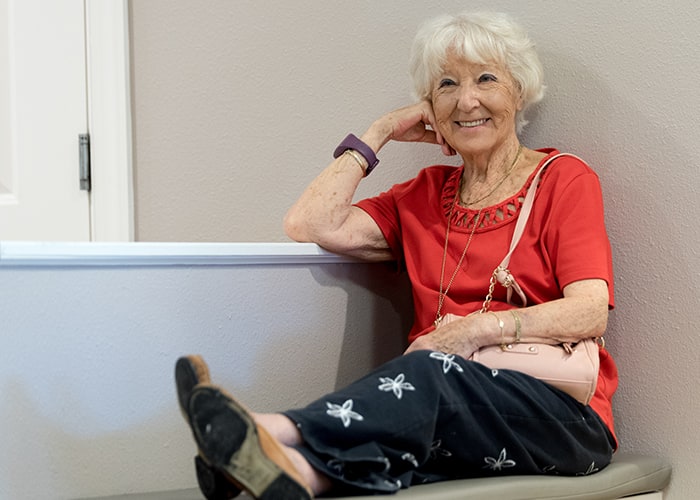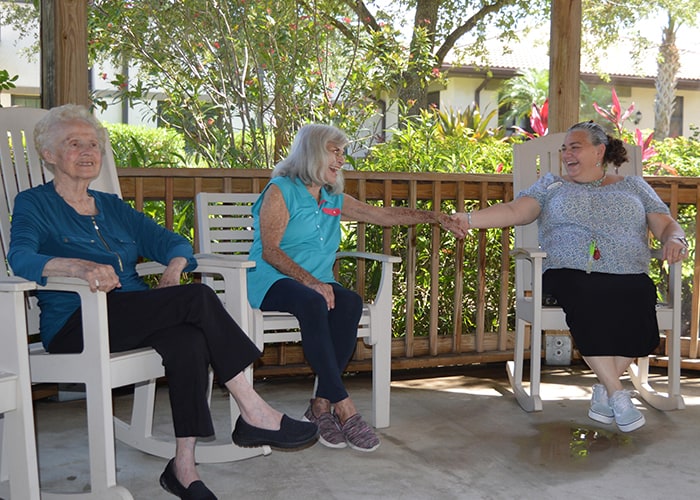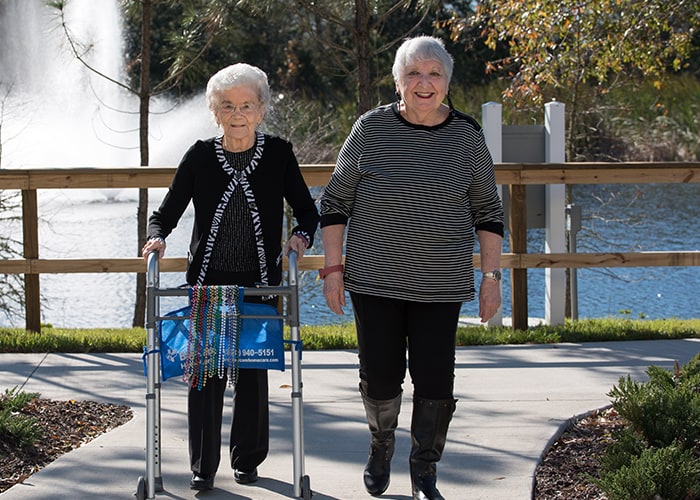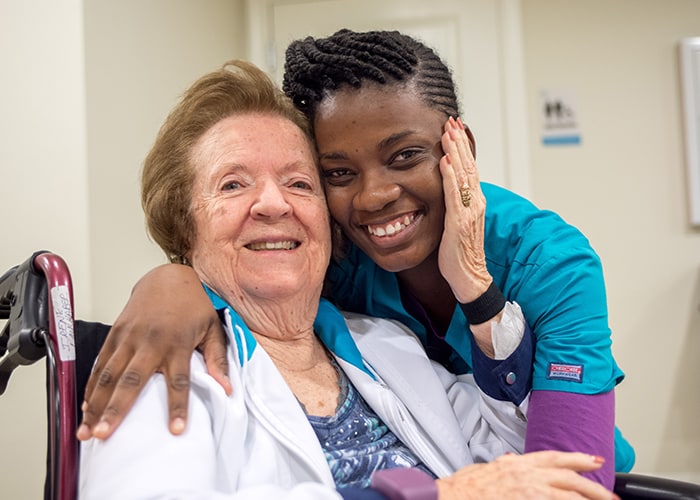Getting older doesn’t just mean more wrinkles and achy joints. Our minds change, too. And these mental shifts affect everything from our moods to our cognition. Senior mental health issues are widespread. Over 20% of adults aged 60 and older suffer from some form of mental disorder. So, in this guide, we’ll break down the key mental health challenges seniors face. We’ll also provide tips and resources for supporting the mental well-being of older loved ones in a senior living setting.
The Most Common Senior Mental Health Issues
A variety of mental health conditions become more prevalent in old age. Let’s look at some of the most frequently diagnosed issues among seniors.
Depression
Depression doesn’t discriminate based on age. However, biological and social changes make seniors especially vulnerable. The prevalence of major depressive disorder in adults 65+ is between 5-10%. And around 15% of seniors in assisted living exhibit depressive symptoms.
Some common depression symptoms in older people include:
- Persistent sadness, emptiness, or anxiety
- Irritability and restlessness
- Loss of interest in hobbies or social activities
- Changes in sleep patterns and appetite
- Fixation on past failures or death
Seniors tend to downplay or dismiss their depressive symptoms. They may also experience barriers to seeking help, such as stigma and access issues. Lifestyle modifications can assist in managing depression. Regular physical activity, a nutritious diet, and adequate sleep can positively affect mood and energy levels. Social interaction is also vital; isolation can exacerbate depressive symptoms, so encourage regular contact with friends and family.
Dementia
Dementia refers to memory loss and reduced cognitive ability severe enough to interfere with daily functioning. Alzheimer’s disease accounts for 60-80% of dementia cases. Roughly 25% of seniors aged 85+ have Alzheimer’s. And over 5 million Americans age 65+ are living with the disease.
As dementia progresses, common symptoms include:
- Impaired memory, judgment, and decision making
- Confusion about time or place
- Difficulty completing familiar tasks
- Changes in mood and personality
- Withdrawal from work, family, and social activities
Anxiety Disorders
While anxiety is a natural response to stress, anxiety disorders involve excessive, ongoing worry and fear. Generalized anxiety disorder and phobias are most common among seniors. An estimated 15% of seniors cope with severe anxiety.
Symptoms include:
- Excessive worry about health, family, friends, finances, and other issues
- Feeling agitated, restless, irritable
- Muscle tension
- Difficulty sleeping
- Racing thoughts
What Causes Mental Health Issues in Seniors?
Aging itself brings biological changes that contribute to senior mental health problems. But social and environmental factors also play a significant role.
Biological Causes
Physical changes in the elderly brain impact neurotransmitters like dopamine and serotonin. This can negatively affect cognition, memory, and mood regulation. The aging brain also becomes less adept at filtering stimuli. And seniors have fewer neural pathways due to cell loss. These changes make it harder to adapt to new circumstances and process emotions.
Social Isolation
Losing loved ones and leaving the workforce leads many seniors to feel disconnected. Isolation and loneliness often increase the risk of anxiety, depression, and cognitive decline. Over 17% of seniors say they interact with friends, family, and neighbors less than weekly. And 43% report feeling lonely regularly.
Conditions Like Chronic Illness
Chronic diseases often associated with aging, like arthritis, cancer, and diabetes, can cause pain and disability. Coping with these conditions strains mental health. Additionally, medications used to treat physical illness sometimes have side effects impacting mood and brain function.
The Consequences of Poor Senior Mental Health
Ignoring mental health issues threatens seniors’ quality of life. It can worsen medical conditions and mortality risk.
Impaired Daily Functioning
Untreated mental illness inhibits seniors’ ability to complete activities of daily living. Tasks like household chores, driving, medication management, and personal care become difficult. This loss of independence often leads to older people moving into assisted living or nursing home facilities earlier than necessary.
Worse Physical Health
Mental illness indirectly impacts physical health in multiple ways. For instance, depression has been linked to reduced immune function and poor compliance with treatment plans. Seniors struggling with mental health are also less likely to exercise, eat nutritious diets, and get adequate sleep. They’re more prone to accidents and falls, too.
Increased Substance Abuse
Many seniors turn to alcohol and prescription medications as a form of self-medication when dealing with undiagnosed mental illness. But substance abuse only worsens anxiety, depression, and cognitive impairment over time. It also interacts negatively with medications and exacerbates health issues.
Greater Risk of Suicide
Sadly, seniors have the highest suicide rate of any age group. Over 6,000 Americans aged 65+ die by suicide every year. Mental health disorders like depression and schizophrenia increase seniors’ suicide risk. But isolation, chronic pain, and the recent loss of loved ones also contribute.
Supporting Senior Mental Health
The good news? Plenty of resources exist to support the mental well-being of older adults. Here are some top ways to help the seniors in your life thrive.
Observe & Check In
Watch for signs of mental distress like personality changes, angry outbursts, or sleeping issues. Ask how they’re doing and listen without judgment. Just knowing someone cares helps.
Encourage Socializing
Make transportation arrangements so seniors can attend religious services and social events. Schedule regular visits with family and friends. Help elderly loved ones connect with peers through senior centers.
Discuss Counseling & Treatment
Don’t neglect troubling mental health symptoms. Voice concern and offer to help find professional assistance. Many seniors benefit from therapy and medication to treat anxiety and depression.
Choose the Right Living Environment
If independent living becomes challenging, choose assisted living or memory care, which is known for enriching psychosocial health. Look for engagement opportunities and cognitive support.
Practice Self-Care
Caregivers must also prioritize their mental well-being through healthy habits, relaxing breaks, and social connections. Joining a support group helps many family members cope.
Senior Living Mental Care
Mental illness affects an alarming number of seniors. But a supportive community and proper treatment can vastly improve seniors’ emotional health and quality of life. We hope this guide sheds light on this critical issue. Please get in touch with us to learn more about our senior assisted living and memory care services in Florida, Georgia, and Louisiana. Ask us about the Inspired Living Thrive program that focuses on proactively nurturing your mind, body, and spirit!


























